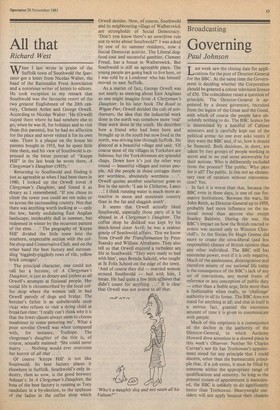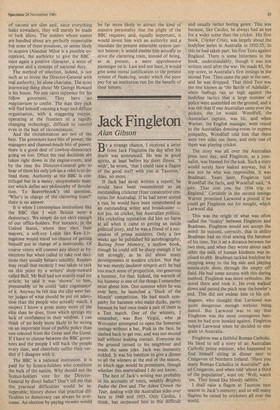Broadcasting
Governing
Paul Johnson
Last week saw the closing date for applications for the post of Director-General for the BBC. At the same time the Government is deciding whether the Corporation should be granted a colour television licence of £50. The coincidence raises a question of principle. The Director-General is appointed by a dozen governors, recruited from the legion of the Great and the Good, with which of course the people have absolutely nothing to do. The BBC licence fee is determined by a handful of Cabinet ministers and is carefully kept out of the political arena: no one ever asks voters if they want the BBC and, if so, how it should be financed. Both decisions, in short, are taken by tiny groups of people working in secret and in no real sense answerable for their actions. Who is deliberately excluded from the process? The public. Who pays for it all? The public. Is this not an elementary case of taxation without representation? Yes.
In fact it is worse than that, because the BBC even in these days, is one of our formative institutions. Between the wars, Sir John Reith, as Director-General up to 1938, probably had more influence on the national mood than anyone else except Stanley Baldwin. During the war, the BBC's impact on how the British reacted to events was second only to Winston Churchill's. In the Sixties Sir Hugh Greene did more to create the ultra-liberal (and less responsible) climate of British opinion than any other individual. The BBC still has enormous power, even if it is only negative. Much of the aimlessness, disintegration and therefore misery of our national life today is the consequence of the BBC's lack of any set of convictions, any moral frame of reference or any conception of public duty — other than a feeble urge, little more than a fashionable whim really, to 'challenge' authority in all its forms. The BBC does not stand for anything at all; and that in itself is a serious fact, granted the enormous amount of time it is given to communicate with people.
Much of this emptiness is a consequence of the decline in the authority of the Director-General, to which Anthony Howard drew attention in a shrewd piece in this week's Observer. Neither Sir Charles Curran's nor Sir Ian Trethowan's appointment stood for any principle that I could discern, other than the bureaucratic principle that, if a job exists, it must be filled by someone within the appropriate range of qualifications and seniority. So long as the present system of appointment is maintained, the BBC is unlikely to do significantly better than Trethowan. Heavyweight outsiders will not apply because their chances of success are slim and, since everything leaks nowadays, they will merely be made to look idiots. The insiders whose names are bandied about are perfectly respectable but none of them possesses, or seems likely to acquire (Alasdair Milne is a possible exception), the authority to give the BBC once again a positive character, a sense of purpose and a concept of national duty.
The method of selection, indeed, is not such as to invest the Director-General with real authority, let alone charisma. The most interesting thing about Mr George Howard is his house. No one cares tuppence for his fellow governors. They have no magisterium to confer. The man they pick will find himself running a huge and diffuse organisation, with a staggering output, operating at the frontiers of a rapidly changing technology, difficult to control even in the best of circumstances.
And the circumstances are not of the best. The governors have bits of power; the managers and channel-heads bits of power; there is a good deal of cowboy-democracy going on too. Often the real decisions are taken right down in the engine-room, and by the time the Director-General gets to hear of them his only job (as a rule) is to defend them. Authority at the BBC is centrifugal but in a messy, unsystematic manner which defies any philosophy of devolution. To Beaverbrook's old question, 'Who's in charge of the clattering train?' there is no answer.
It is when I contemplate institutions like the BBC that I wish Britain were a democracy. We simply do not elect enough of our office-holders. For instance, in the United States, where they elect their mayors, a soft-toy Lenin like Ken Livingstone would stand no chance of getting himself put in charge of a metropolis. Of course voters will commit any idiocy at byelections but when called to take real decisions they usually behave. sensibly. Readers may recall that recently I was taken to task on this point by a writers' shop-steward called Bull. Mr Bull had not exactly read my article; he said it was 'shown' to him, presumably so he could 'take cognisance' of it. Anyway he felt that the elite were better judges of what should be put on television than the people who actually watch. I suspect I know a great many more of the elite than he does, from which springs my lack of confidence in their wisdom. I can think of no body more likely to be wrong on an important issue of public policy than one selected from the Great and the Good. If I have to choose between the BBC governors and the people I will back the people every time, and cheerfully suffer their verdict if I disagree with it.
The BBC is a national institution. It is paid for by licence-holders who constitute the bulk of the nation. Why should not the licence-holders vote for the DirectorGeneral by direct ballot? Don't tell me that the practical difficulties would be insuperable; history shows that practical difficulties to democracy can always be overcome. An election by paying viewers would be far more likely to attract the kind of massive personality that the plight of the BBC requires; and, equally important, it would invest him with an authority and a mandate the present miserable system cannot bestow; it would enable him actually to drive the clattering train, instead of being, as at present, a mere apprehensive passenger on it. Last and not least, it would give some moral justification to the present system of financing, under which the poor pay for an institution run for the benefit of their betters.















































 Previous page
Previous page